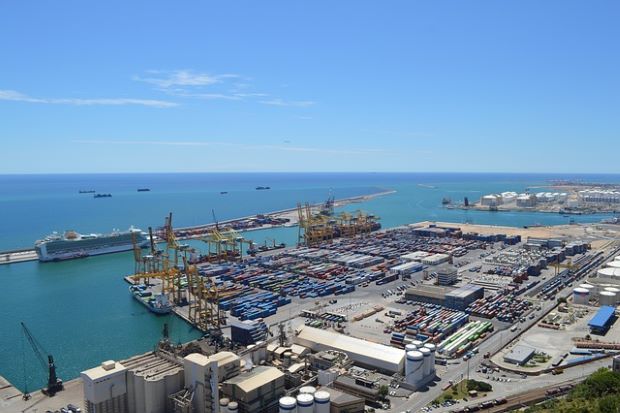 June 13, 2023 - By: Viktoriia Mikhalchuk
June 13, 2023 - By: Viktoriia Mikhalchuk
European ports suffered in the first quarter. However, there are cargo categories that are growing
The Port of Hamburg recorded a drop in transshipment volumes of more than 10 percent in the first quarter of 2023. Previously, a decrease was also observed in the largest ports of Europe – in Antwerp and Rotterdam. Fewer containers and general cargoes are accepted, but bulk cargoes are kept well.
In the first three months of 2023, the port of Hamburg handled 28.1 million tons of cargo, down 10.2 percent compared to the same period last year.
The port management accuses:
– in the slowdown of world trade
-geopolitical tension
– sanctions against Russia
– high inflation
-large stocks in warehouses
Against the background of a reduction in transshipment of containers in the ports of Northern Europe, at the same time, the volumes of cargo loading increased.
Things were no different in Hamburg. In the first quarter, transshipment of bulk cargoes at the port increased by 5.4 percent. And on an annual basis – up to 9.3 million tons. In this category, the volume of bulk cargoes increased by 12.3 percent (crude oil by more than 27 percent).
This is a direct consequence of the war in Ukraine and the embargo on Russian oil, which forced European countries to look for sources of supply of this raw material abroad.
Antwerp was also affected
Not only the German port suffered from the economic downturn in the first quarter. Worse results were also recorded in Europe’s largest ports, Benelux. The Belgian complex Antwerp-Zebrugge served 4.5 percent less than the annual volume – 67.7 million tons
In the container category, the decline was 5.7 percent in TEU, so there was more than average for all cargoes – as was the case with the port of Hamburg.
However, the category of general cargo decreased significantly – by 19.8 percent.
Compared to the first quarter of 2022, this segment was particularly affected by:
– a drop in demand for steel and metal products due to the slowdown in economic growth
The volumes of dry bulk materials decreased by 7.3 percent. compared to last year – largely due to a 26 percent decrease in fertilizer transshipment. On the other hand, the volume of hard coal has increased almost three times – the consequences of sanctions against Russia are also in effect here.
In the bulk cargo category, the Belgian port showed a minimal increase of 0.5 percent. Particularly significant growth was recorded in the LNG category (by 23 percent), as well as in the volumes of diesel fuel and other petroleum products. The decrease in this category was due to the transshipment of chemical products (a decrease of 21 percent).
The Port of Antwerp is the leader in the car transshipment category. In the first three months of the current year, their number increased by 7.2 percent compared to the same period last year and amounted to more than 904,000 cars. Overloading of all vehicle categories increased by 4.3 percent compared to the previous year.
The Russian blockade fell on Rotterdam
In the first quarter of 2023, the Port of Rotterdam handled 111.7 million tons of cargo, compared to 113.4 million tons in the first three months of 2022. The worst performers are mainly related to the container and general cargo categories.
Container transshipment decreased by 11.6% to 3.2 million TEU. This was influenced by the closure of the Russian market, the share of which at the beginning of the war in Ukraine was about 8 percent of the volume of container cargo. In addition, the transshipment of goods imported from Asia decreased by 14 percent compared to the first quarter of 2022.
In the segment of general cargo, the decrease was less noticeable – 6 percent less cargo (7.9 million tons) was transshipped. In this category, Ro-Ro cargoes became cheaper by 2.2 percent. up to 6.6 million tons.
As in Hamburg, transshipment of bulk cargoes of all categories increased. Their volumes increased by 0.2 percent. up to 17.9 million tons. Of these, iron ore increased by 10 percent to 6.2 million tons. Also, 26% more hard coal (7.4 million tons) was transshipped.
In the bulk cargo category, 54.3 million tons were transported in January-March 2023 – by 5.6 percent. more than in the previous year. In this segment, transshipment of crude oil increased by 3.2 percent (up to 26.3 million tons). More dynamic growth (by 12 percent) is characteristic of oil products – their transshipment amounted to 15.1 million tons.
Leave a comment